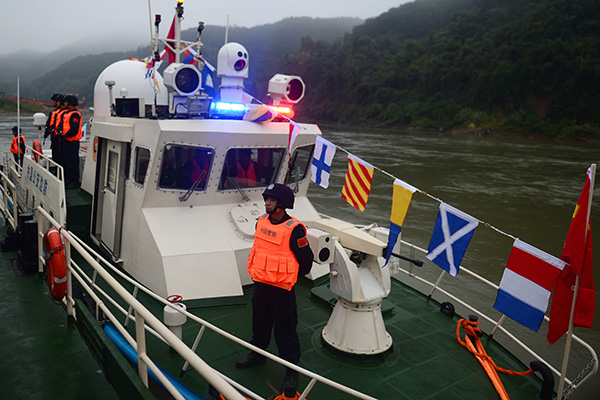
China Coast Guard members on a patrol boat take part in a joint law enforcement cooperation mission on the Lancang-Mekong River in Yunnan province in December.[Photo/Xinhua]
Security along the Lancang-Mekong River has improved greatly since China, Laos, Myanmar and Thailand established a law enforcement cooperation mechanism to combat rampant cross-border crime.
Before this, the number of cross-border crimes on the river-including drug-trafficking, terror attacks, smuggling of firearms and humans, and illegal immigration-had risen sharply, according to the Ministry of Public Security.
“Such crimes tend to become severe and complex on the river, posing a serious threat to regional security and stability,” said a senior official at the ministry, who declined to be named.
In October 2011, the four countries agreed in Beijing to set up a law enforcement cooperation mechanism, under which they conduct joint patrols to combat cross-border crimes along the river.
The decision was taken after 13 Chinese sailors were killed by a drug trafficking ring in the Golden Triangle area of the river, comprising parts of Thailand, Laos and Myanmar.
“The law enforcement mechanism has played an essential role in maintaining safety and promoting economic prosperity,” the official said.
According to the Ministry of Public Security, between December 2011 and last year, the four countries conducted 41 joint law enforcement activities on the river. These greatly reduced cross-border crime.
In the past four years, they have uncovered more than 9,000 cross-border drug-trafficking cases, arrested more than 10,000 suspects and seized 36 metric tons of drugs on the river. They also rescued 135 commercial ships targeted by drug traffickers and other organized gangs.
Yang Yun, a Chinese businessman who runs a shop that sells daily necessities in Guanlei port, Yunnan province, said, “Since the four countries began law enforcement cooperation in 2011, security on the river has greatly improved. Wholesalers from Laos, Myanmar and Thailand now come to China to buy goods each month, and I benefit a lot.”
Wang Ronghua, a Chinese crew member who has helped to transport goods on the river for more than five years, said, “Before this, commercial ships were subjected to extortion and blackmail on the river and were also charged protection fees.”
To further enhance judicial cooperation, the ministry said China will set up a comprehensive law enforcement center in Jinghong, Yunnan, to strengthen intelligence exchanges with Laos, Myanmar and Thailand.
Three information-sharing branch centers will be set up in the three countries to help with intelligence analysis and case investigation. The ministry will also send law enforcement officers to the river to handle cross-border crimes promptly.
Drug gang leader launched fatal attacks
In 2011, two Chinese cargo ships refused to pay protection money to a drug-trafficking gang on the Mekong River.
Naw Kham, the leader of the gang, swore to take revenge.
On Oct 5, the Hua Ping and Yu Xing 8, which had refused to pay for protection, were attacked and 13 Chinese fishermen aboard were murdered. Their bodies were found floating on the river, with the eyes and mouths covered with black tape and the hands bound.
According to the Ministry of Public Security, between 2008 and 2011, the gang launched 28 attacks against Chinese cargo ships on the river, killing 16 citizens and injuring three.
The gang was busted in early 2012 amid a joint law enforcement operation by police from China, Laos, Myanmar and Thailand.
In November 2012, a court in Yunnan province sentenced Naw Kham and three of his subordinates to death for the murders of the 13 Chinese sailors.
In February 2013, Naw Kham and the accomplices, identified as Hsang Kham, Yi Lai and Zha Xika, were executed by lethal injection in Kunming, Yunnan, according to Kunming Intermediate People’s Court.
